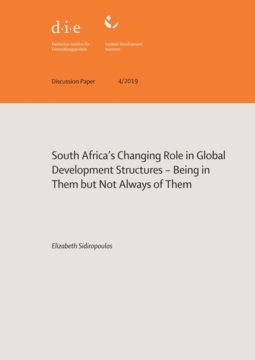South Africa’s engagement in global development structures has evolved since 1994, when the country re-entered the international community. The historical philosophical underpinnings of the African National Congress, the governing party, aimed to reaffirm the country’s place in the Global South and African firmament after the end of apartheid. This understanding is necessary in the context of South Africa’s priorities over the past 25 years, not least in the development debates. The last two decades have seen significant attempts to develop global norms that tackle the serious developmental challenges faced by developing countries. The paper explores these initiatives and divides them into three streams – those undertaken by the United Nations, those begun by the Development Assistance Committee of the Organisation for Economic Co-operation and Development (OECD-DAC), and those that may be understood as part of club governance processes (such as the G20, the BRICS (Brazil, Russia, India, China, South Africa), and the India-Brazil-South Africa Dialogue Forum (IBSA). South Africa’s engagement in these global development structures is analysed, along with its contribution to the evolution of African agency on the issues of global development. South Africa has strongly criticised existing power relations while undertaking strategic engagements with the North, centred on the vision of an African renaissance and the New Partnership for Africa’s Development initiative. The country has consistently argued that Northern aid cannot be put on the same platform as South-South Cooperation as they have different origins. Other African states and continental institutions have also ramped up their engagement on global development and development cooperation in recent years, which the paper also explores. While South Africa has always identified Africa as a core pillar of its foreign policy, its interests have not always cohered with those of the rest of the continent. Lastly, the paper explores possible avenues that South Africa might pursue in the current polarised multilateral environment. Its biggest challenge is the tension regarding its Global South identity, which has to balance its commitment to African issues and institutional processes, and its positioning via its membership of the BRICS as an emerging power that seeks to contest the current global power configurations.
- Veröffentlicht am Freitag 19. Dezember 2025 von Deutsches Institut f. Entwicklungspolitik
- ISBN: 9783960210955
- 59 Seiten
- Genre: Gesellschaft, Politik, Sachbücher, Wirtschaft
